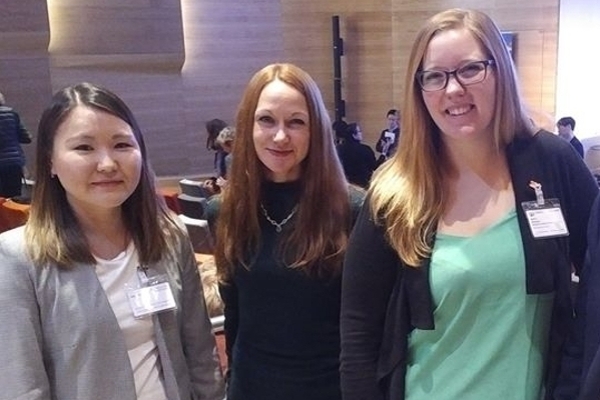
The Nuclear Debate: Can we move from polarization to cooperation?
Three students from the Johnson Shoyama Graduate School of Public Policy and the Centre for the Study of Science and Innovation Policy (CSIP) presented at the Nuclear Energy Agency (NEA) workshop that was held in Paris, from December 12 -13, 2019. The NEA workshop titled ‘The nuclear and social science nexus: challenges and opportunities for speaking across the disciplinary divide’, offered the trio an opportunity to share their research and to learn from the diverse group of experts gathered.
By Mariia Iakovleva, Larissa Shasko, Michaela Neetz, JSGS graduate studentsThe Nature of the Problem
Public opinions and concerns, distrust in industry and government, and opposition to siting of the industry are a few of the major concerns that nuclear energy faces. Public perceptions often differ from expert perceptions of risk, and radiation does not lend itself to be easily demonstrated as safe as it is invisible. There is an element of, what was referred to in the meeting as, “the unexpected” that radiation brings, and nuclear energy inherently carries with it. The term ‘nuclear’ is now associated with low-carbon energy, medical diagnostics, and the atomic bomb, these each carry negative and positive attributes. Nuclear energy, as such, has long been debated and has polarized views.
Social scientists have been working to address the polarized nature of the nuclear debate, and to open the closed model of decision making, while public engagement has moved toward two-way dialogues, trust and relationship building. Moreover, questions have been reframed to ask “Why do the experts deserve to be trusted?” rather than “Why do citizens not trust experts?”
Key Points for Further Discussion
What do we get when we remove “nuclear” from the debate?
Taking a literal stance in the Canadian context, we move from nuclear energy to natural gas energy or from uranium mining to copper mining. In either example, we move from heavily regulated to lesser regulated industries.
There is usually a distinction between nuclear specialists and the public. However, it is important to look at the bigger picture of these debates, to focus on places of intersection between technical, social, and organizational components of a system. It is this area of interaction that is continuously discussed when trying to bridge the science-policy (and society) gap. This could be considered on a broader level, for example, are nuclear projects different from other megaprojects? Or what is the difference in engagement and social acceptance processes for nuclear and other projects? At an intersection with so much potential to affect change this debate should expand and be given the space, as established at this workshop, to continue openly.
What about a Yes-In-My-Backyard (YIMBY) effect?
Nuclear waste storage siting is a challenging area of public engagement, yet a necessary one. The social sciences have placed a fair deal of attention on the NIMBY (not-in-my-backyard) effect but perhaps not enough on the existence of YIMBY (yes-in-my-backyard). How ‘enthusiastic consent’ is defined and measured or if it can be measured prompted in-depth discussion.
The changing relationship between renewable energy and nuclear energy
In the past, renewable and nuclear energy have largely operated in separate ideological spheres, each dismissive of the other as a suitable energy option. Yet, the required transition to a low carbon economy in a limited timeframe requires a common forum for renewables and other low-carbon options, such as nuclear energy, to cooperate not just coexist. How can this space be created?
These questions stretch beyond the nuclear debate to other issues and debates within policy and the social sciences. More time should be spent discussing and reflecting on the intersection of technical, social, and organizational components, what does consent mean and how is it measured, and how to cooperate beyond coexistence.
Authors
MarIia Iakovleva, PhD candidate, Johnson Shoyama Graduate School of Public Policy
Mariia is originally from the far north eastern region of Russia—the Republic of Sakha (Yakutia). She has a background in philology, sociology (Indigenous studies), and sustainable development of the Arctic. She gained her Bachelor’s degree in English and English literature from the North-Eastern Federal University in Russia, Master’s degree in Arctic studies from the University of Versailles (Saint-Quentin-en-Yvelines) in France and Master’s in Northern Governance and Development from the University of Saskatchewan. Mariia also completed online courses of Bachelor of Circumpolar Studies at the University of the Arctic with an advanced emphasis in local and regional governance and development at the Arctic University of Norway. She has experience working for the regional government of Yakutia in the area of scientific and innovational projects’ development. Her research interests include energy policy, community-based energy development in northern remote communities including renewable technology and small modular nuclear reactors.
Larissa Shasko, Master of Public Policy student and Robertson Scholar, Johnson Shoyama Graduate School of Public Policy
Larissa’s thesis research areas include public engagement, small modular nuclear reactors (SMRs) and climate change. With over 13 years of experience as a climate change researcher and activist, Larissa is interested in understanding the political barriers to taking policy action on climate change, and researching conflict and polarization of energy policy. Her main research areas include climate change, energy policy, public engagement, energy justice, renewable energy, small modular nuclear reactors, and binary constructions of knowledge.
Michaela Neetz, Master of Public Policy student, Johnson Shoyama Graduate School of Public Policy
Michaela obtained a Bachelor’s of Science, majoring in geophysics from the University of British Columbia, Vancouver. Before returning to university, she worked in mineral exploration across the Canadian territories and Alaska. Michaela’s research interests include policy stability and change, public perceptions, and evidence-based policy. Her thesis is focused on public, media, and policy attention to radon, working with agenda-setting theories and concepts.

